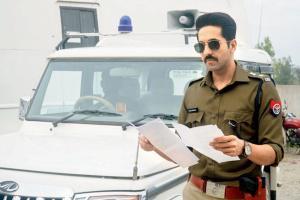Let this be the first recommendation among several to follow: Do watch Article 15, when it opens this weekend

Ayushman Khurana in a still from the film Article 15, which is a sparklingly moody, atmospheric sort of investigative piece, along the lines of Alan Parker's Mississippi Burning (1988)
 We all know about there being two Indias, blah blah. Most of these clichés about the rural/urban schisms, while progressively shrinking in uncanny ways, continue to hold. But, who really stands right at the intersection of the gap between these First and Third worlds—simultaneously living in separate centuries— within the same country?
We all know about there being two Indias, blah blah. Most of these clichés about the rural/urban schisms, while progressively shrinking in uncanny ways, continue to hold. But, who really stands right at the intersection of the gap between these First and Third worlds—simultaneously living in separate centuries— within the same country?
ADVERTISEMENT
More than anyone else—the central government bureaucrat. They get to these jobs cracking arguably one of the world's toughest (UPSC) exams. Which covers for its syllabus (the General Studies paper, in particular), practically everything under the sun!
Their first posting, in their early 20s, involve small towns, overseeing rural hamlets, in thoroughly distant states. This, when their general-awareness and academic exposure is at its peak. But the land they survey is wholly opposite to the books they've 'rattofied' to get there—let alone cultures they come from. Writer Upamanyu Chatterjee played this aspect up charmingly, with the young IAS probationer Agastya Sen's character in his cult fiction English, August: An Indian Story (1988). It got made into a film in 1994, by director Dev Benegal, with actor Rahul Bose in the lead role.
What's common between Agastya Sen and actor Ayushmann Khurana's character Ayan Ranjan, the young IPS officer, in the extremely watchable film Article 15, which releases this Friday? That they both graduated from St Stephen's College in Delhi. Which, while it has a 50 per cent "Jesus (Christian) quota" provides an altogether ethnically/religiously/racially blind environment to grow up in. Where, really, nothing outside your personality/attitude/talents matter, to assimilate, and thrive.
This is true for most, if not all, quality educational institutions in India, including the college across St Stephen's, named Hindu. But, the similarities between the Pink Floyd loving, odd-fellow Agastya in Midnapore, and Stephanian Ayan, also posted in what's described as "[Newspaper] Page Seven India"—end there.
For, Sen's book was a tragic-comedy. Article 15 is more of a sparklingly moody, atmospheric sort of investigative piece, along the lines of Alan Parker's Mississippi Burning (1988), which has already been (rather superficially) remade as Aakrosh (2010), by Priyadarshan.
Article 15 is directed by Anubhav Sinha (Tum Bin, Tum Bin 2, Dus, Cash, RA.One), who since Mulk (2018), on religious prejudices, has almost overnight emerged as a filmmaker with an engagingly powerful, principled voice. The film is named after the Article in the Indian Constitution that guarantees non-discrimination over accidents of birth such as caste, etc.
Or in fact, all other frictions/schisms/obfuscations that politicians, who publicly swear by the Constitution, shrewdly take advantage of, to divide and rule. The only time a nationwide Emergency (1975) was officially imposed on India also happened within provisions of the same Constitution. But that's another matter.
Article 15 is essentially a crime thriller. Foremost, it works because Sinha allows his actors—the dazzling Manoj Pahwa and others—breathing space to build a strong moral-drama around gang-rape of two women in a Dalit village near a small town. At the centre of it is, of course, the deathly calm and composed Khurana as the conscientious cop, shocked by a society so deeply split over caste. He's unable to grasp the dynamic.
Don't think anything sums up caste from a deracinated, urbane perspective as Akhil Katyal's short poem, Poetic Licence. Further shortened here, it goes: 'One day when he was / About ten or twelve / He asked his mother / "What is my caste"… The mother got up / In the middle of her supper / "Beta, if you don't know it by now / It must be upper!"
Khurana's Ayan Ranjan has a friend in this town, who he once studied with, called Satyendra, who's gone missing. Although unrelated, reminded me of an IIT engineer Satyendra Dubey, whose college-mate was the local, investigating SP, when he died mysteriously in the same town.
Satyendra was a whistleblower in the ongoing corruption in the highway project that he was overseeing in Gaya, in Bihar. Nobody in Gaya had even heard of Dubey, or his mysterious death, when I went to cover that story, soon after, in 2004. I spent couple of days with the sympathetic Gaya SP. I still couldn't find appointment/time with the local DIG. He was too busy playing golf, in a town, where even the police wouldn't step out in the evenings—let alone regular public—for fear of Maoist and upper-caste (Ranvir Sena) violence.
Similarly, nobody seems to care much for a missing woman, and two who have been gang-raped in the fictional Uttar Pradesh town Lalgaon—dominated by the outlawed 'Bhim Sena'—where this film is set. There is complicity dressed up as "santulan" (keeping balance) in corridors of power. The system, I suspect, is more likely to eventually change Khurana's young IPS officer than he's ever likely to change it. Yeah, this is real, North India—from ground-level. Hence, the incredibly significant film.
Mayank Shekhar attempts to make sense of mass culture. He tweets @mayankw14 Send your feedback to [email protected]
The views expressed in this column are the individual's and don't represent those of the paper
Catch up on all the latest Crime, National, International and Hatke news here. Also download the new mid-day Android and iOS apps to get latest updates
 Subscribe today by clicking the link and stay updated with the latest news!" Click here!
Subscribe today by clicking the link and stay updated with the latest news!" Click here!






